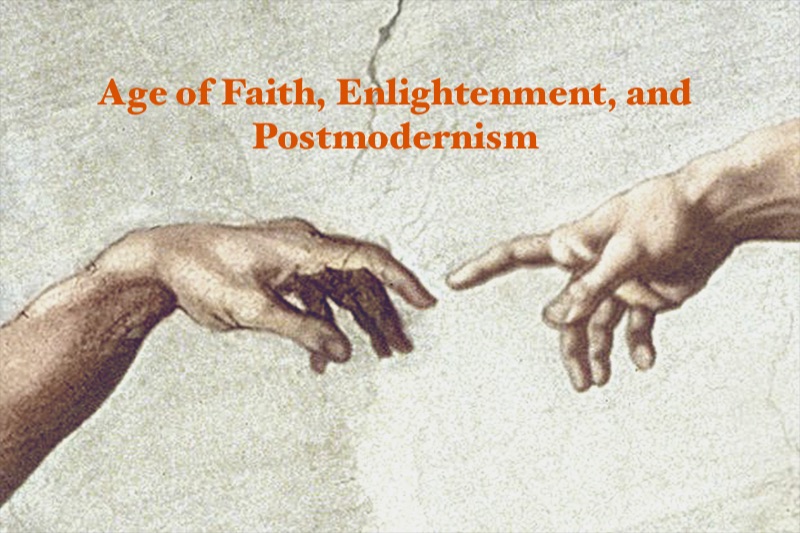
Human thought at the beginning of history likely resembled a cauldron of ideas with little foundational grounding. These ideas were susceptible to change and control by external, unknown, and mysterious forces. In what we now call the Age of Faith (A.D. 325-1300), magical thinking, supernatural ideas, and religious beliefs found fertile soil in this intellectual turmoil.
Then, in what is considered the long 18th century (1685-1815) thinking became radically reoriented by a new-found skepticism and questioning of traditional authority. It led to an embrace of the notion that humanity could be improved through rational change. This Enlightenment Era, known as the Age of Reason, was specific and somewhat definite in its self-understanding of what it meant to be “rational” and “modern.” For one, the term modern conveyed an understanding of “liberal” or “progressive” and linked with “reason” and “rationality.”
Enlightenment writers and thinkers had backgrounds in the sciences, and related scientific advancement to the overthrow of religion and traditional authority in favor of free speech and thought. Yet, a great philosopher of those times — Friedrich Nietzsche — suggested that intellectual prowess and true “rationality” involved a sense and quality of rhythm, deliberateness, restraint, balance, and proportionality. Rationality, he argued, is not a mere quantity or calculation, it is more like dance or music. He rejected the notion that there is any such thing as a ‘rational truth’ or a ‘universal morality.’ It was Nietzsche’s clarion call for a new and much-needed synthesis.
In the early 1900s a third radical change occurred in conceptual thinking that we now associate with postmodern thought. The 20th century exploded with novel ideas about concepts such as quantum mechanics, cubism, modern music, and Freudian psychology. These novel ideas challenged the accepted notions of space, time, motion, nature and natural law, history and social change, and the basis of human personality. By the middle of the 20th century, science had demolished the bedrock ideas that it itself had established. For one, science had initially set matter as the fundamental substrate in nature, as well as the idea that all elements, including consciousness, result from material interactions. But the same objective analysis investigating such realities questioned and shattered this foundation of materialism and of our basic identities.
In this postmodern world, scientists and intellectuals saw the negation of many Enlightenment or progressive virtues and values. The result was that many intellectuals imagined the main alternative to materialism as an absence or emptiness, or great void containing nothing. This absence or groundlessness conflicted with the existential longing for definition and individuation.
Before long, these attacks on foundational ideas of being produced individuals that Alan Watts described as “adrift without landmarks in a universe which more and more resembled the Buddhist principle of the ‘Great Void.’” Furthermore, faced with such a possibility, the greatest wisdom of the West, its religious, philosophical, and scientific traditions, Watts argued, did not offer much guidance to the art of living in such a reality. To be nothing, immaterial, stand on nothing, and have no guidance on how to move forward can be psychologically disconcerting, paralyzing, and frightening. This is the postmodern sensibility.
At the beginning of the 21st century, we seem to be standing at another junction in which both faith and reason are being challenged. Although many attempts at synthesis have been put forth throughout history, including St. Thomas Aquinas Summa Theologica and the recent Ludato Si of Pope Francis I, these arguments assume a synthesis that maintains the independence between faith and reason. This does not seem far-reaching enough.
From a perspective of unity, the nature of postmodern emptiness, absence, groundlessness, or void, or the battle between faith and reason, is much more sensible and positive. Emptiness in this viewpoint is not the absence of things, but a condition in which actions flow unimpeded and unobstructed by other actions. In such a universe, matter performs its own unencumbered role. This way, emptiness serves as foundational for matter to express itself in a natural and perfect way. If no emptiness condition existed, it might not be possible for the material world to exist and function. To understand and live within THIS perspective is to overcome the postmodern sensibility. It is to live a productive life in which one feels at home in groundless emptiness. And in which one feels no terror but a positive delight. This is the potential of the contemporary synthesis, of what Nietzsche’s called “true rationality.”
This is a very condensed essay about large themes. I welcome your thoughts.

